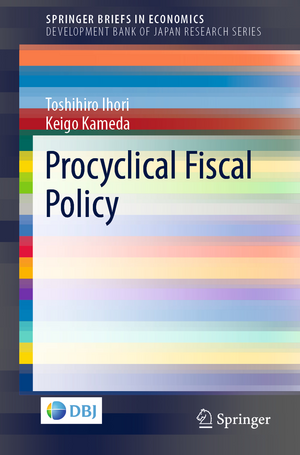Procyclical Fiscal Policy: SpringerBriefs in Economics
Autor Toshihiro Ihori, Keigo Kamedaen Limba Engleză Paperback – 14 ian 2019
Din seria SpringerBriefs in Economics
-
 Preț: 444.35 lei
Preț: 444.35 lei -
 Preț: 264.79 lei
Preț: 264.79 lei - 15%
 Preț: 462.51 lei
Preț: 462.51 lei -
 Preț: 47.33 lei
Preț: 47.33 lei -
 Preț: 353.14 lei
Preț: 353.14 lei -
 Preț: 273.32 lei
Preț: 273.32 lei -
 Preț: 376.04 lei
Preț: 376.04 lei -
 Preț: 379.09 lei
Preț: 379.09 lei -
 Preț: 380.07 lei
Preț: 380.07 lei -
 Preț: 377.35 lei
Preț: 377.35 lei -
 Preț: 379.09 lei
Preț: 379.09 lei -
 Preț: 376.59 lei
Preț: 376.59 lei -
 Preț: 408.27 lei
Preț: 408.27 lei -
 Preț: 379.09 lei
Preț: 379.09 lei -
 Preț: 383.27 lei
Preț: 383.27 lei -
 Preț: 378.54 lei
Preț: 378.54 lei -
 Preț: 377.95 lei
Preț: 377.95 lei -
 Preț: 340.23 lei
Preț: 340.23 lei -
 Preț: 380.25 lei
Preț: 380.25 lei -
 Preț: 378.12 lei
Preț: 378.12 lei -
 Preț: 376.04 lei
Preț: 376.04 lei -
 Preț: 376.04 lei
Preț: 376.04 lei -
 Preț: 379.68 lei
Preț: 379.68 lei -
 Preț: 381.00 lei
Preț: 381.00 lei -
 Preț: 375.23 lei
Preț: 375.23 lei -
 Preț: 376.80 lei
Preț: 376.80 lei -
 Preț: 378.54 lei
Preț: 378.54 lei -
 Preț: 377.57 lei
Preț: 377.57 lei -
 Preț: 376.04 lei
Preț: 376.04 lei -
 Preț: 378.92 lei
Preț: 378.92 lei -
 Preț: 375.62 lei
Preț: 375.62 lei -
 Preț: 379.09 lei
Preț: 379.09 lei -
 Preț: 353.67 lei
Preț: 353.67 lei -
 Preț: 342.14 lei
Preț: 342.14 lei -
 Preț: 375.45 lei
Preț: 375.45 lei -
 Preț: 379.09 lei
Preț: 379.09 lei -
 Preț: 377.35 lei
Preț: 377.35 lei -
 Preț: 344.86 lei
Preț: 344.86 lei -
 Preț: 377.35 lei
Preț: 377.35 lei -
 Preț: 345.89 lei
Preț: 345.89 lei -
 Preț: 377.57 lei
Preț: 377.57 lei -
 Preț: 343.83 lei
Preț: 343.83 lei -
 Preț: 378.12 lei
Preț: 378.12 lei -
 Preț: 345.06 lei
Preț: 345.06 lei -
 Preț: 379.48 lei
Preț: 379.48 lei -
 Preț: 379.48 lei
Preț: 379.48 lei -
 Preț: 380.07 lei
Preț: 380.07 lei -
 Preț: 375.45 lei
Preț: 375.45 lei -
 Preț: 445.33 lei
Preț: 445.33 lei -
 Preț: 378.54 lei
Preț: 378.54 lei
Preț: 409.25 lei
Nou
Puncte Express: 614
Preț estimativ în valută:
78.31€ • 81.97$ • 65.18£
78.31€ • 81.97$ • 65.18£
Carte tipărită la comandă
Livrare economică 31 martie-14 aprilie
Preluare comenzi: 021 569.72.76
Specificații
ISBN-13: 9789811329944
ISBN-10: 981132994X
Pagini: 46
Ilustrații: XIII, 68 p. 19 illus., 9 illus. in color.
Dimensiuni: 155 x 235 mm
Greutate: 0.13 kg
Ediția:1st ed. 2018
Editura: Springer Nature Singapore
Colecția Springer
Seriile SpringerBriefs in Economics, Development Bank of Japan Research Series
Locul publicării:Singapore, Singapore
ISBN-10: 981132994X
Pagini: 46
Ilustrații: XIII, 68 p. 19 illus., 9 illus. in color.
Dimensiuni: 155 x 235 mm
Greutate: 0.13 kg
Ediția:1st ed. 2018
Editura: Springer Nature Singapore
Colecția Springer
Seriile SpringerBriefs in Economics, Development Bank of Japan Research Series
Locul publicării:Singapore, Singapore
Cuprins
1 Numerical Overview of Fiscal Cyclicality.- 2 Theory of Procyclical Fiscal Policy.- 3 Budget Deficits and Income Fluctuation in a Political Economy.
Notă biografică
Toshihiro Ihori is a special professor of economics at the National Gradual Institute for Policy Studies and a professor emeritus of The University of Tokyo. He is an Academic Advisor of the Research Institute of Capital Formation, Development Bank of Japan. He has a B.A. and a M.A. from The University of Tokyo and a Ph.D. in economics from Johns Hopkins University. His major field of research is public economics. Details are at the web site of the National Gradual Institute for Policy Studies.
Keigo Kameda is a Professor of Economics at School of Policy Studies, Kwansei Gakuin University. His main areas of research are public finance and macroeconomic policies. Born in 1970, Prof. Kameda received a Bachelor’s degree in Economics at Keio University in 1993 and a Ph.D. in Economics at Keio University in 2014. He was appointed Professor of Economics at School of Policy Studies, Kwansei Gakuin University in 2015.
Caracteristici
Develops a new and plausible explanation as to why and when governments should control the budget deficits procyclically Empirically shows how democratic economies whose government functions weakly should adopt procyclical fiscal policies Provides a worm-eye, in-country analysis of Japan and shows that procyclical analysis should be adopted in rural areas Presents a comprehensive review of the recent discussion of fiscal cyclicality
